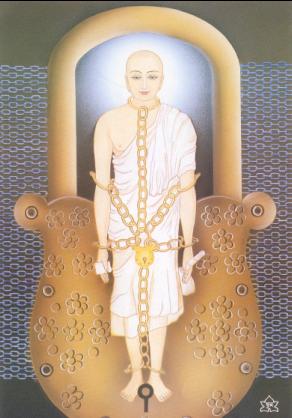|
|
Acharya Manatunga - Man behind Bakthaamar stotra
|
|
Bhaktamar Stotra’ ('Bakth' + 'Amar') having 48 Chhanda (Verse), s is very popular Stotra among Jains, daily recited in so many families. It is supposed that every verse (Chhanda) of this Stotra has the power of Mantra and is helpful in getting the dreams materialized.
|
True story depicting the miracle of Bakthamar stotra-
King Bhoj seated on the throne of Dhara Nagari (presently city of Dhar) in year 1100 AD. Great poet ‘Kalidas’ was one of the members of his assembly – Royal Court. One Jain poet ‘Dhananjaya’ was also becoming famous those days in the city. One day King Bhoj called Dhananjaya in his royal court and get introduced with him and praised him for his poems & wisdom.
Shri Dhananjaya told the king very politely that his all wisdom & knowledge was due to his teacher (Guru) Acharya Mantunga – a Jain Muni (Saint), he said that all the knowledge is due to the blessings of Acharya Mantunga. After knowing about the praise worth Acharya Mantunga, King Bhoj desired to meet with Acharya. King Bhoj ordered his servants to bring Acharya Mantunga to his royal court with honor. At that time Acharya were staying at Bhojpur and doing Tapa (Penance) for self – realization – purification. Servants of King Bhoj reached there, prayed Acharya again & again to go with them to city of Dhara to meet their King Bhoj. But ascetic saints have no purpose in meeting with King or any other persons. So Acharya gave no reply to servants and engrossed in deep Tapa or meditation. Servants returned to King and told about their failure. So the King Bhoj became angry and he ordered to bring the Acharya forcefully in his royal court. Servants do the same and thus Acharya were brought before King Bhoj. The king praised Acharya and requested to give some religious precepts to the audience present there. But up to that time looking unfavorable situations, Acharya decided to remain silent during such conditions. So all the prayers & requests of King were all in vain, so King became angry and he ordered to his soldiers to place the Acharya in prison. Thus Acharya were placed in prison.
|

|
In the prison Acharya Mantunga started the prayer of Bhagwan Adinath (the 1st Teerthankar), thus he wrote in Sanskrit language a great poem – the ‘Bhaktamar Stotra’ having 48 Chhanda (Verse), this is very popular Stotra among Jains, daily recited in so many families. It is supposed that every verse (Chhanda) of this Stotra has the power of Mantra and is helpful in getting the dreams materialized.
Due to the effect of Bhaktamar Stotra, Acharya Mantunga automatically came out of prison. The watchman saw this miracle, but thinking about the self-ignorance, he again closed Acharya in prison and checked the locks firmly. But after sometime locks of prison again opened and Acharya were free again. Seeing this the watchman hurried to the king and told him about the event. King came there and he ordered the soldiers to tie Acharya firmly with strong chains and kept in the prison having 48 locks. Acharya again recited Bhaktamar Stotra and all the 48 locks with chains broken. Acharya automatically came out of prison. Looking this miracle, King Bhoj felt down in the feet of Acharya, he pardoned for his mistake again & again.
After this, Acharya Mantunga entered the city of Dhara, due the effect of preaches & Tapa of Mantunga, so many peoples accepted Jain Dharma (religion).
Later on Acharya Mantunga stayed at Bhojpur he practiced for penance & meditation, tried to get rid of worldly affection & aversion. At the end, he accepted ‘Sallekhana Vrit’ and give up his body doing Tapa. Shrine of Acharya Mantunga and his Siddha Shila (a rock where Acharya seated for Tapa & meditation) is also here in Bhojpur. A pair of footprints of Acharya Mantunga are installed on the shrine.
At a distance of 13 km from Dhara, in the village ‘Ahu’, ruins of 48 pillars may be seen where Acharya were kept during prison.
|
|